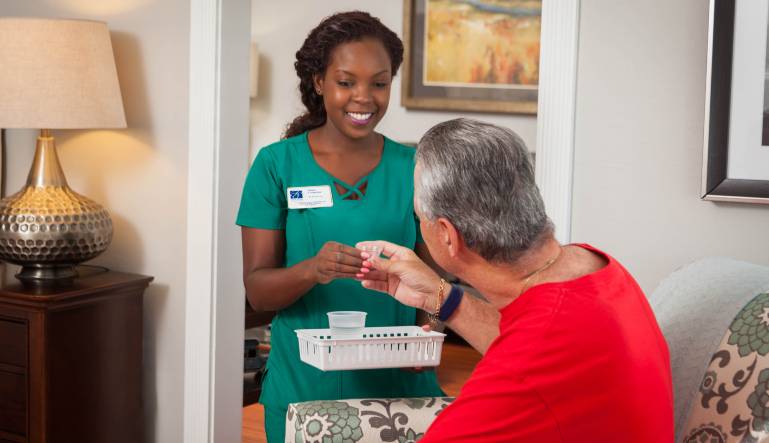Exploring different senior living options for you or an aging loved one can feel overwhelming. You want to make the right choice for you or your loved one’s health and happiness, while also respecting your family’s desires regarding staying at home or transitioning to a senior living community. Both senior living arrangements have benefits and drawbacks worth considering. In this article, we’ll help clarify your options when choosing between assisted living and non-medical home care for seniors so that you can make the best, most informed choice for you and your family.
What is Non-Medical Home Care?
When you hire non-medical home care, a home care aide will come to you or your loved one’s home and stay—either round-the-clock or on a pre-determined schedule. This person, sometimes called a senior care companion or home aide, can help perform daily tasks provide companionship.
Non-Medical Care versus Skilled Home Health Care
It’s important to note the difference between non-medical care and home health care. Nearly anyone—even without a medical license—can perform non-medical care. In fact, the burden often falls on a family member, who isn’t paid for these services.
On the other hand, home health professionals are skilled medical professionals who can often administer medications, offer occupational therapy services, change wound dressings, and assess overall health. If you or your loved one is experiencing health concerns or if you’re worried about moving safely around the house, home health care is worth considering. Unfortunately, home care for seniors, both medical and non-medical, can be expensive and the costs can quickly add up to thousands of dollars a month, particularly if round-the-clock care is needed.
What Is Assisted Living?
In an assisted living community, staff is available 24/7 to provide non-medical care services. You or your senior loved one receives care and companionship she or he whenever it’s necessary.
In addition, an assisted living community often provides social activities from group yoga classes to movie night to keep residents engaged with life. Many also offer wellness programs, healthy meal options and transportation. If you opt for in-home non-medical care, you’ll have to pay separately for these types of services.
Non-Medical Home Care or Assisted Living?
Caregivers and seniors often believe non-medical home care is a suitable, more cost-effective option to assisted living. They might even believe non-medical home care gives a senior more freedom. For an older adult who wishes to age in place, in-home care may be the right option. Here are some of the key differences between the two to consider:
Assisted Living vs. Home Care Comparison Table |
||
|
Assisted Living |
Home Care |
|
| What types of care are provided? | In assisted living, residents may need some help with transportation, medication management, housekeeping and other specific activities of daily living such as dressing and personal care, but still live independently. | Care may include:
|
| What other services are offered? | Residents receive three nutritious meals each day and access to life enrichment programs and social activities like yoga classes and movie nights to keep residents engaged with life. | Services may include:
|
| What is the living situation like? | Assisted living communities are designed to feel home-like and residents typically live in their own apartments or suites with private baths and kitchenettes. | Home care allows for aging in the comfort of your own home, but modifications to the home might be necessary to maintain independence. |
| How much does it cost? | The median cost of assisted living in the United States in 2021 was $4,300 per month, according to Genworth’s most recent Cost of Care Survey. | In 2021, the average cost of a home health aide $5,148 per month. |
Another major benefit of assisted living is that your care is spread out across an entire team instead of one individual. If your home health aide calls in sick or needs to care for someone else, few alternative options are available. Assisted living means your loved one will always have the care they need, when they need it.
Note: Your money may go further in an assisted living community since large expenses like rent and dining are included, along with a wide variety of activities and close companionship with other older adults you can’t get with a home aide. Download our FREE Guide to the Cost of Senior Living eBook to learn more about how assisted living may be more cost effective than you think.
When analyzing all factors, including costs, it’s important to remember the following:
- A senior who uses non-medical home care must pay the home aide, along with all the usual expenses such as meals, mortgage, taxes, and utilities
- Assisted living includes non-medical care, as well as a place to live, transportation, some meals, home maintenance (including lawn care), and utilities
- Assisted living provides services when you or your loved one needs it, round-the-clock
Move or Stay?
The decision to move to assisted living or to age-in-place with help from a home aide is a difficult one. Find a Five Star Senior Living community near you to see if the environment, services and amenities would be the right fit for you.
Contact Us Today
"*" indicates required fields

